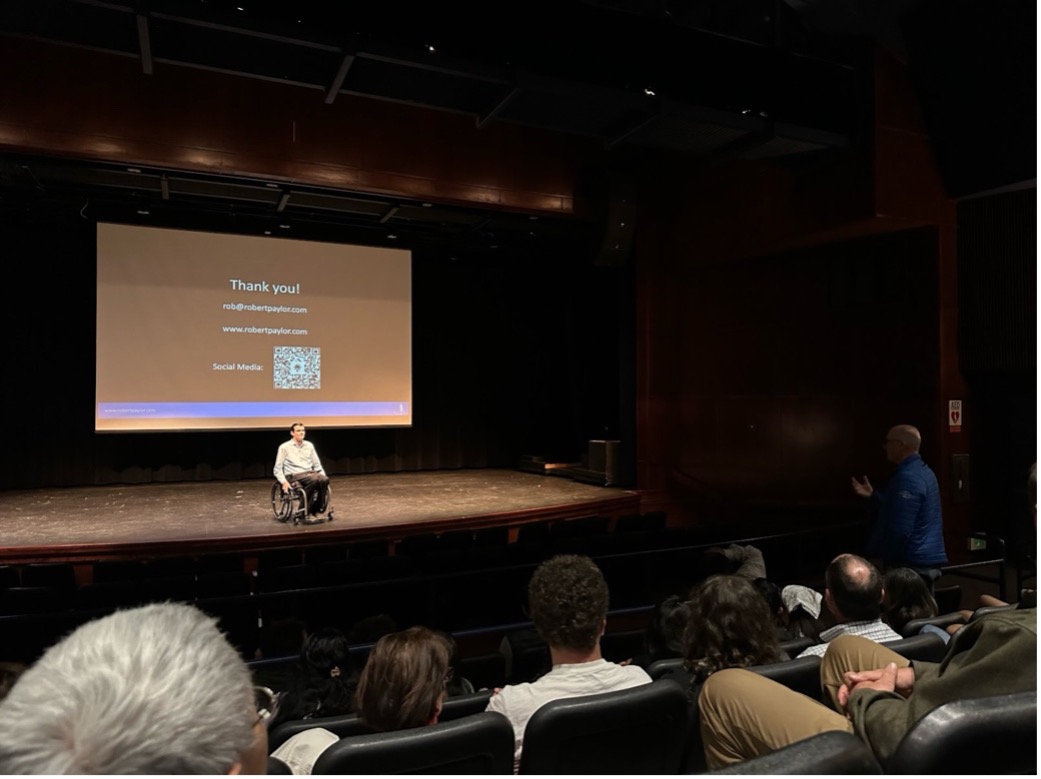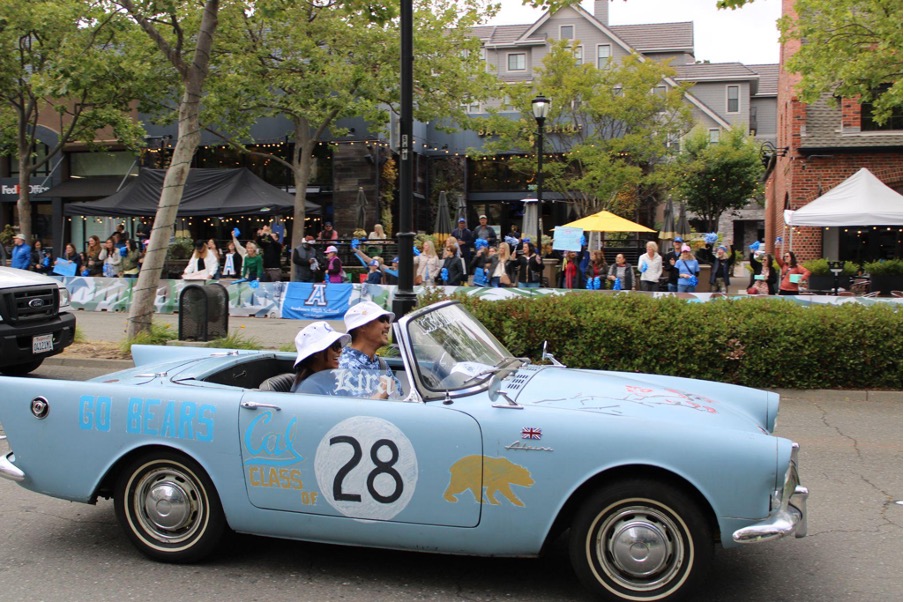Former UC Berkeley rugby player Robert Paylor’s path in life has been anything but smooth sailing.
In 2017, Paylor, a sophomore on Cal’s rugby team, was injured during the collegiate national championship, leaving him paralyzed from the neck down. Yet, through consistent rehabilitation efforts, Paylor overcame this tremendous challenge, reaching goals that included walking 400 yards and earning his diploma from UC Berkeley’s Haas School of Business.
Now, he shares his story with the world, offering motivation to inspire others on their own uphill battles, and sparking greater conversations about the importance of motivation for students.
Paylor spoke to a large crowd at the Acalanes High School Performing Arts Center on March 19. His speech, titled “Paralyzed to Powerful,” is an ongoing series by Paylor, who has presented it to companies, including Meta, TEDx and Kaiser Permanente. Paylor addresses how individuals can recognize and overcome their struggles, whatever they may be.
At Acalanes, he posed the question, “What paralyzes you?” and followed with three mental tools he learned during his recovery. They were to “control your mindset,” “practice perspective” and “work with and for others.”
In an interview after his presentation, Paylor noted that his message about perspective is particularly relevant for high school students today.
“When I was in high school, I mean, life was really good. The biggest things that were not going my way was like getting number two in the nation for a rugby championship [or being] really stressed out about college applications or tests, stuff like that. And when things didn’t go my way, you know, I might not have had the right perspective to be able to react to them in a way that was really constructive,” said Paylor.
Students in attendance were intrigued by Paylor’s story.
“The speech was centered around grit, determination and mindset. I really liked how [Paylor] emphasized surrounding yourself with positive people because this allows you to stay focused on your goals and stay positive, instead of getting down on yourself,” said Acalanes High School 11th grader Ade Waples. “He also highlighted the power of forgiveness, which I originally found surprising.”
Waples said he attended the event out of curiosity and a desire to learn something new.
“My favorite part of the speech was when [Paylor] stood up out of his wheelchair because his former doctor told him he never would be able to do that,” Waples said. “So it proved that it is possible to achieve seemingly unreachable goals by thinking positively about an unfortunate situation and trying your best to push through it.”
Acalanes student-athletes, in particular, found inspiration in Paylor’s story, especially those enduring injuries similar to his situation.
Sophie Chinn, an 11th grade varsity basketball and track and field athlete, suffered an anterior cruciate ligament (ACL) and meniscus tear that ended her junior season in both sports. Reflecting on her own setback, Chinn expressed initial frustration, but acknowledged the importance of goal-setting and a commitment to rehabilitation.
“Robert introduced me to the phrase ‘compared to what.’ This phrase allows me to step aside from what I am going through and to look at the challenges others are facing,” Chinn explained.
“It is cool because this phase can apply to anything from school, to work, to sports.”
Chinn said, “Robert emphasized that it is OK to ask for help, which is something that can be difficult for me, but I have found that everyone is willing to support me during this [rehabilitation] process. I have gotten so much support from friends, family and just the community, which has helped me continue to want to get better and stronger.”
She added, “Robert’s speech showed me that my injury is temporary and that I can overcome this challenge by having a positive mindset and setting mini goals for myself during recovery.”
Katherine Daniels, a counselor at Edna Hill Middle School in Brentwood, said she appreciated Paylor’s speech for its motivational message, which students need academically and socially.
“I believe motivation is extremely important when it comes to whether a student is going to be successful or not. Students need to be motivated to come to school, complete their work, study for tests and participate in class,” Daniels said. “I believe that connections help greatly with student motivation and that when students don’t feel connected to their school or people at their school, they are less likely to be motivated, which means they are less likely to do well.”
Chinn agreed about the value of motivational speeches like Paylor’s.
“Motivational speeches challenge students to adopt new perspectives or change their mindset. This can involve shifting from a fixed mindset to a growth mindset, embracing failure as a learning opportunity, or seeing obstacles as stepping stones to success,” Chinn said. “These speeches allow students to build confidence in themselves and display a path of potential growth.”
*Additional resources:
https://haaspodcasts.org/podcast/robert-paylor-bs-20-beating-the-odds-with-a-positive-mindset/
https://haas.berkeley.edu/undergrad/community/blog/posts/humans-of-haas-robert-paylor/
https://www.si.com/college/cal/other-sports/robert-paylor-graduation
Haley Chelemedos is an 11th grader at Acalanes High School in Lafayette.



